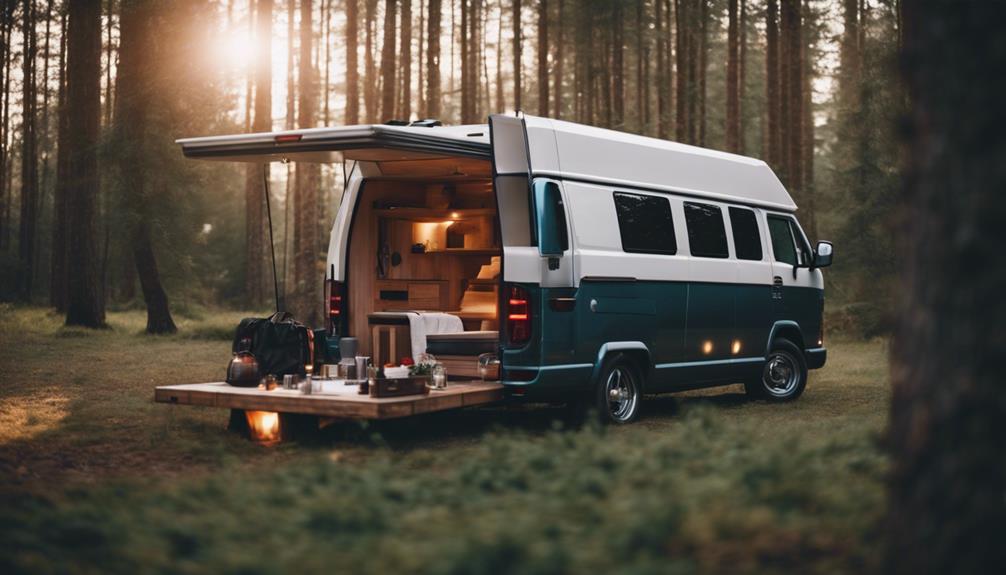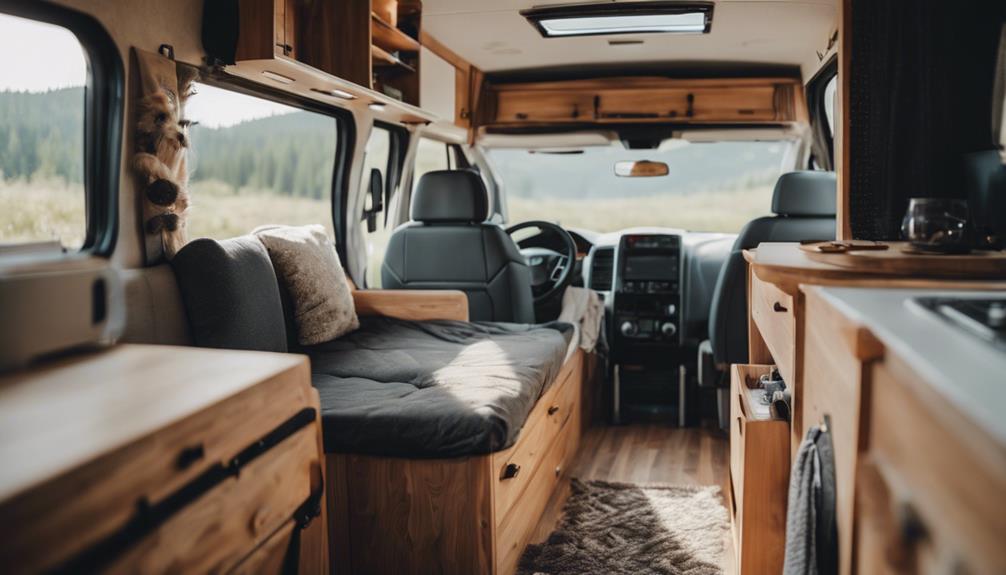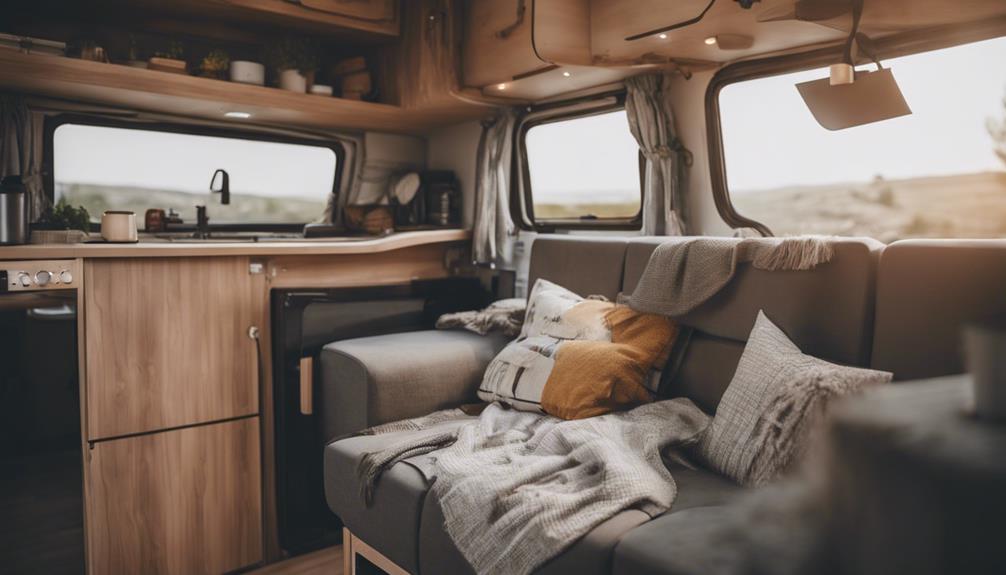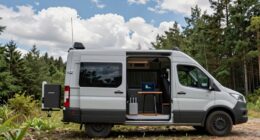If you're looking for the best camper conversion vans, consider the Mercedes Sprinter, Ford Transit, and Ram ProMaster. The Sprinter offers a spacious interior and high resale value, perfect for long-term adventures. The Transit is versatile and budget-friendly, boasting excellent fuel efficiency. Meanwhile, the ProMaster provides a wider interior layout, making it ideal for taller conversions. Each of these models brings unique benefits that cater to different needs and budgets. As you explore your options, you'll uncover even more insights to help you make the best choice for your van life journey.
Introduction
When it comes to camper conversions, choosing the right van can make all the difference in your adventure experience.
Among the most popular van models, the Mercedes Sprinter stands out for its spacious interior, superior build quality, and customization options, making it a top pick for camper van conversions.
If you're looking for versatility, the Ford Transit offers multiple sizes and configurations, along with good fuel economy, appealing to both DIY enthusiasts and professional converters alike.
On the other hand, the Ram ProMaster features a front-wheel drive layout that enhances urban maneuverability and provides a wider interior space, ideal for taller and more functional conversions.
While larger vans provide comfortable living arrangements, smaller options like the Nissan NV200 and Ford Transit Connect are budget-friendly and fuel-efficient, although they may limit your interior space for amenities.
It's essential to take into account conversion costs, which can range from approximately $5,000 to $31,000, depending on the complexity and quality of materials used.
Background Information
Van life has exploded in popularity, attracting people seeking adventure and flexibility in their travels.
With this trend, electric vans are emerging as a sustainable option, offering eco-friendly alternatives for your journeys.
Understanding these shifts can help you choose the right camper van for your lifestyle and needs.
Van Life's Rise in Popularity
Many people are drawn to the van life movement due to the newfound freedom and flexibility that remote work offers. This lifestyle allows you to blend work and adventure, making camper van conversions a popular option among those seeking travel flexibility. Millennials and Gen Z are at the forefront of this trend, embracing a minimalistic lifestyle that prioritizes experiences over possessions.
The rise of social media platforms like Instagram and YouTube has fueled the popularity of van life, as influencers share their journeys and DIY camper van conversion projects. These platforms provide endless inspiration and practical tips, making it easier for you to imagine life on the road. Recent surveys show that nearly 60% of aspiring van lifers cite the desire for freedom in travel as their primary motivation.
As interest in this lifestyle grows, so does the market for camper vans and conversion kits. You'll find an increase in DIY resources and professional services tailored to help you achieve your dream van conversion. With so many options available, it's never been easier to join the van life movement and start your own adventure.
Emergence of Electric Vans
Electric vans are transforming the camper conversion landscape by offering eco-friendly alternatives that appeal to modern travelers. Models like the Mercedes eSprinter and Ford E-Transit are at the forefront, making sustainable transportation a reality. With a projected market growth rate of over 25% from 2021 to 2028, it's clear that more people are seeking electric vans for their camper conversions.
One major advantage of electric vans is their lower maintenance costs. With fewer moving parts and no need for oil changes, you'll save time and money in the long run. Plus, advancements in battery technology have improved the average range of these vehicles to between 100 and 200 miles per charge, making them suitable for short to medium-distance travel.
Government incentives and rebates for electric vehicle purchases are also encouraging you to contemplate these options. By choosing an electric van, you're not just opting for a vehicle, but embracing the eco-friendly benefits that come with it.
As you plan your next camper conversion, reflect on how an electric van can enhance your adventures while contributing to a greener planet.
Electric Van Innovations
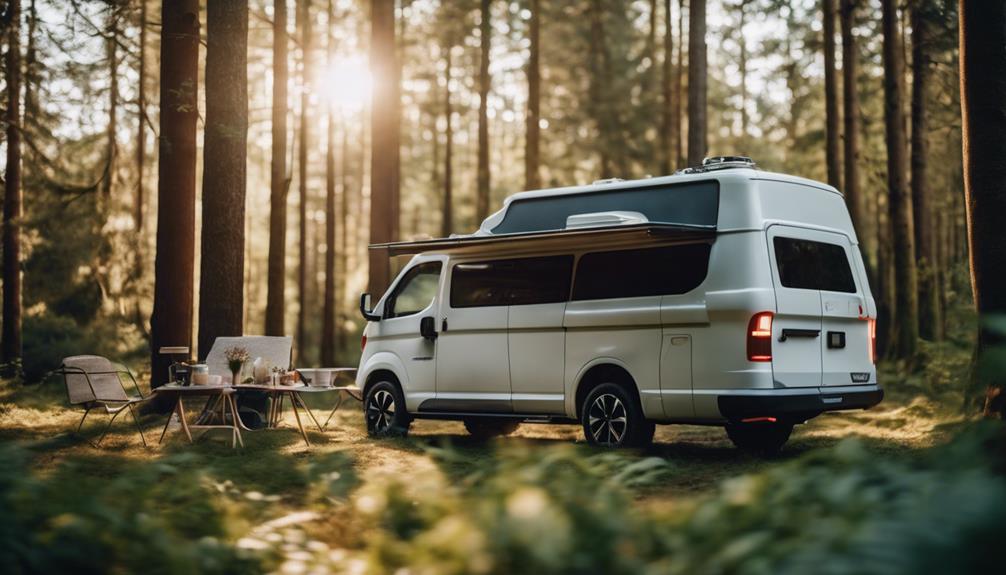
When you're exploring electric van options, models like the Ford E-Transit and Mercedes eSprinter stand out with their eco-friendly features.
You'll find advanced battery technology that not only extends your travel range but also enhances your overall camping experience.
Plus, these innovations open up exciting possibilities for off-grid living with solar integration and efficient charging solutions.
Electric Van Models Available
Innovative electric van models like the Mercedes eSprinter and Ford E-Transit are transforming camper conversions with their eco-friendly features and impressive ranges.
These electric vans offer a sustainable option for those looking to travel without harming the environment. The Mercedes eSprinter provides zero emissions and can go up to 200 miles on a single charge, making it ideal for longer road trips. Meanwhile, the Ford E-Transit, which launched in 2022, has a flexible cargo interior and a range of about 126 miles, perfect for urban camping adventures.
If you're considering versatility, the Rivian R1T, though primarily a pickup, has a spacious interior and can be adapted for camping, boasting an outstanding range of over 300 miles. The Volkswagen ID. Buzz, with its retro design, offers up to 300 miles of range and a customizable interior, making it a fun choice for camper conversions.
With advances in battery technology, these models now feature fast-charging capabilities, allowing you to obtain up to 80% charge in around 30 minutes. This means you can spend less time charging and more time enjoying your adventures!
Advanced Battery Technology Options
Advanced battery technology options are revolutionizing camper van conversions, offering enhanced energy efficiency and longer lifespans for your adventures.
One of the standout options is lithium-ion batteries, which deliver higher energy density and longevity compared to traditional lead-acid batteries, making them perfect for off-grid living. You'll find that many modern electric camper vans come equipped with integrated energy management systems, optimizing battery usage for better efficiency and extended range.
Recent innovations, like solid-state batteries, promise faster charging times and improved safety, potentially transforming the camper van market. When combined with solar panel systems, these advanced battery setups create a sustainable energy source, allowing you to harness renewable energy while traveling.
To make the most of your power, consider using smart battery monitoring systems. These tools let you track real-time battery levels and performance, providing insights that lead to efficient energy management during your trips.
Cost-Benefit Evaluation
When considering a camper conversion van, you'll want to weigh the advantages and disadvantages carefully.
Industry expert insights can help you understand what to expect regarding performance and costs across different models.
Advantages and Disadvantages Overview
Evaluating the advantages and disadvantages of camper conversion vans reveals key factors that can greatly impact your decision-making process.
The Ford Transit stands out for its cost efficiency, with prices ranging from $10,000 to $20,000 and lower maintenance costs averaging $2,500 to $4,000 over five years. In contrast, the Mercedes Sprinter, while pricier starting around $20,000, offers a higher resale value, making it a solid long-term investment.
When considering fuel efficiency, the Ford Transit also shines, averaging up to 19 mpg highway, compared to the Ram ProMaster's slightly lower figures. The ProMaster, however, boasts a wider interior space, perfect for those who prioritize layout flexibility in their van conversion.
While the Sprinter offers high-roof options for added headroom, it comes with potentially higher maintenance costs, which can reach $3,000 to $5,000.
Understanding these advantages and disadvantages helps you weigh the factors of interior space, fuel efficiency, and cost against your personal needs and budget.
Industry Expert Insights
Industry experts emphasize that understanding the cost-benefit dynamics of camper van conversions can lead to smarter investment decisions tailored to your lifestyle.
When considering the best vans for camper conversions, options like the Ford Transit, Mercedes Sprinter, and Ram ProMaster stand out due to their versatility.
Before diving into a camper van conversion, it's crucial to assess conversion costs, which can range widely. Basic adaptations start around €6,236, while advanced setups may soar to €31,126. Significantly, approximately 40% of these costs often go toward electrical systems, so planning those effectively is critical.
Renting a camper van before making a purchase can be a game-changer. It lets you experience different features and helps you identify what you truly need, potentially saving you from costly mistakes. Additionally, always conduct a pre-purchase inspection, usually around €120, to uncover any hidden issues that could affect your investment.
Ultimately, aligning your intended use with these insights will enhance your camper van experience, ensuring that you get the most value from your conversion.
Model Performance Comparison
Understanding the performance and cost-effectiveness of different camper van models is essential for making an informed decision that aligns with your needs.
The Mercedes Sprinter stands out with its durability and high resale value, but it comes with a higher initial price of around $53,400 and elevated maintenance costs, ranging from $3,000 to $5,000 over five years.
On the other hand, the Ford Transit offers a more budget-friendly option at around $52,000, boasting good fuel efficiency—averaging 15 mpg city and 19 mpg highway—and generally lower maintenance costs, between $2,000 and $4,000.
For those seeking affordability, the Ram ProMaster is priced around $50,000. It features a spacious interior, making it ideal for camper conversion, though it tends to have lower resale value. Its fuel efficiency varies, averaging between 14-21 mpg, depending on conditions.
When evaluating these van models, consider the balance between initial cost, maintenance expenses, fuel efficiency, and interior space. Each option serves different needs, so weigh these factors carefully during your conversion process to find the best fit for your lifestyle.
Essential Tools for Conversion
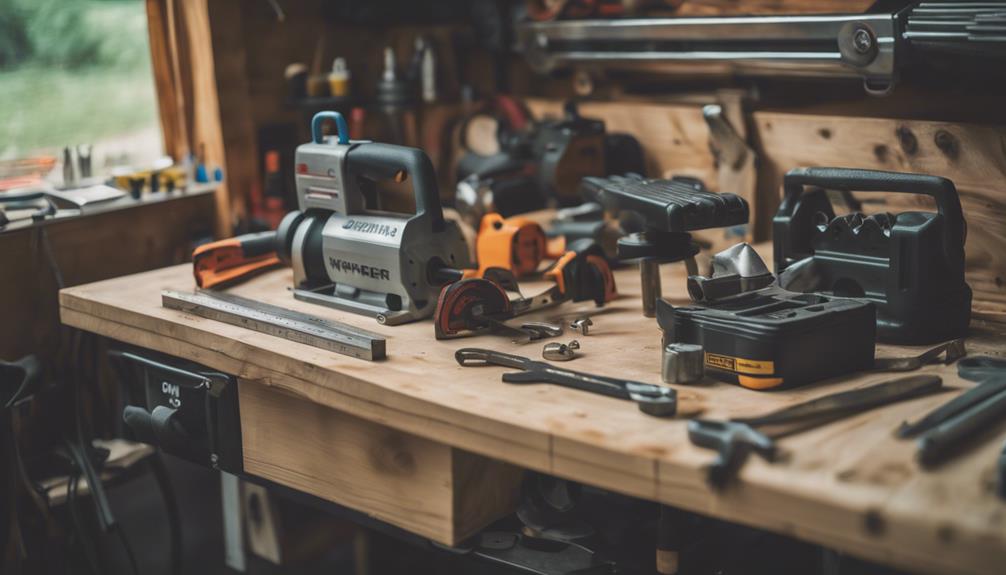
When you're converting a camper van, having the right tools can make all the difference in your process.
You'll need essential items like a circular saw and a drill to get started, but understanding how to use these tools effectively is just as important.
Let's discuss the must-have tools and how they can streamline your conversion project.
Conversion Process Overview
For a successful camper van conversion, having the right essential tools on hand makes all the difference in efficiency and safety. Start with a thorough tool kit that includes a power drill, circular saw, jigsaw, and measuring tape. These tools will help you cut and assemble various components effectively throughout the conversion process.
When tackling electrical work, you'll need additional tools like wire strippers, crimpers, and a multimeter. These are vital for safely installing lighting and power systems in your van.
Don't forget about insulation; a staple gun and adhesive glue will secure materials, enhancing comfort and thermal efficiency in your camper.
As you engage in the conversion, safety equipment should be a top priority. Goggles, gloves, and a dust mask are essential to protect yourself from potential hazards.
With the right tools and safety gear, you'll guarantee a smooth and safe camper van conversion experience. By preparing your workspace with these essential tools, you're setting yourself up for success, making the entire process more enjoyable and efficient.
Conversion Tool Recommendations
Having the right tools at your disposal is essential for a successful camper van conversion.
Start with a circular saw for cutting wood and other materials with precision. A drill will be your best friend for assembling furniture and fixtures, while a jigsaw is perfect for those intricate cuts around windows and corners.
Don't forget a stud finder; it's vital for locating wall studs when mounting cabinets or shelving, ensuring everything stays secure. You'll also need a level to keep surfaces even during installation, which enhances both aesthetics and functionality. A tape measure is indispensable for accurate measurements and will help you optimize space within your van, allowing you to fit various components perfectly.
Lastly, prioritize your safety by wearing safety gear, including gloves, goggles, and a dust mask, to protect yourself from any potential hazards during the conversion process.
With these essential conversion tools in hand, you'll be well-equipped to tackle your camper van conversion project efficiently and effectively.
What Makes Dodge Vans a Top Choice for Camper Conversions?
The best dodge van camper conversion offers ample space, reliability, and versatility, making it a top choice for camper conversions. With its durable build and powerful engine options, Dodge vans provide the perfect base for creating a comfortable and efficient camper that can handle any adventure.
Conclusion
Choosing the right camper conversion van involves balancing factors like build quality, interior space, and budget to guarantee you make an investment that suits your lifestyle and travel needs.
The Mercedes Sprinter stands out for its spacious interior and superior build quality, ideal for those prioritizing longevity and resale value.
If versatility and fuel efficiency are more your style, the Ford Transit offers numerous sizes and configurations along with excellent aftermarket support for customization.
On the other hand, the Ram ProMaster is often the most budget-friendly choice, featuring a wide interior layout perfect for taller conversions, thanks to its front-wheel drive.
When planning your camper conversion, be mindful of conversion costs, which can range considerably based on your desired setup—from around €6,236 for basic builds to approximately €31,126 for advanced configurations.
It's crucial to evaluate factors like reliability and mileage (aim for under 50,000) to guarantee you're selecting the best van model for conversion.
Ultimately, by weighing these factors carefully, you can set out on your van life journey with confidence, knowing you've made the right choice for your adventures.
Frequently Asked Questions
What Is the Best Van for Conversion to Campervan?
When choosing a van for conversion, consider your needs. The Mercedes Sprinter offers space and quality, while the Ford Transit provides versatility. If you seek budget-friendly options, the Nissan NV200 could be ideal for you.
What Is the Most Reliable Used Conversion Van?
When searching for the most reliable used conversion van, consider options like the Mercedes Sprinter and Ford Transit. They offer longevity, strong service networks, and retain their resale value well, ensuring dependable performance for your adventures.
What Is the Best Budget Van to Convert to Camper?
When you're looking for the best budget van to convert, consider the Ram ProMaster City or Ford Transit Connect. They offer affordability, good fuel efficiency, and enough space for a comfortable DIY camper conversion.
Is It Worth Converting a Van to a Campervan?
Converting a van to a campervan can definitely be worth it. You'll save money, customize your space, and enjoy the freedom to travel comfortably while potentially increasing the van's resale value. It's a rewarding investment!
Conclusion
To sum up, choosing the best camper conversion van ultimately depends on your needs and budget.
With exciting electric van innovations and a clear cost-benefit evaluation, you can find the perfect model that matches your adventurous spirit.
Don't forget the essential tools for a successful conversion, as they'll make the process smoother.
Embrace the freedom of the open road, and create unforgettable memories in your custom camper van.
Happy travels!

